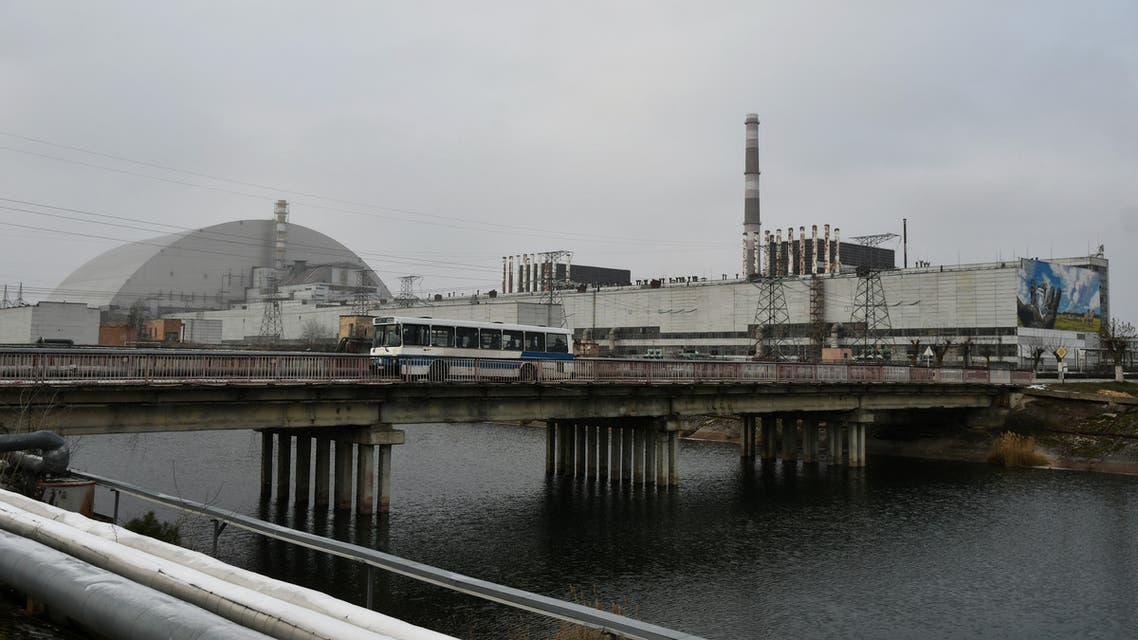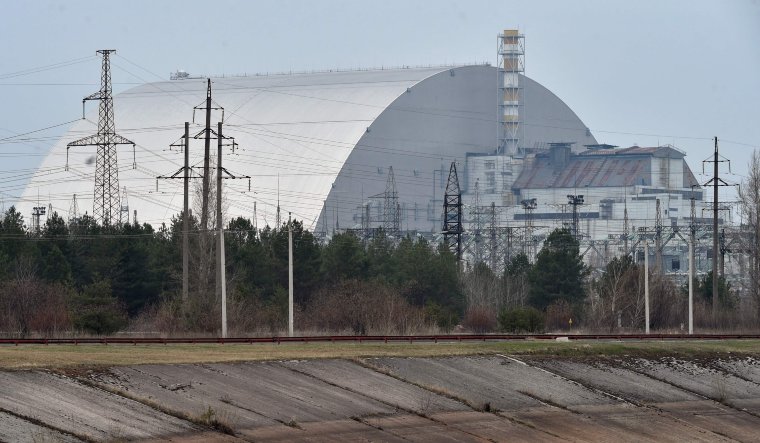
This file photograph taken on December 8, 2020 shows a general view of Chernobyl nuclear power plant. (AFP)
The Associated Press
Published: 23 March ,2022
Russian military forces have destroyed a new laboratory at the Chernobyl nuclear power plant that among other things works to improve management of radioactive waste, the Ukrainian state agency responsible for the Chernobyl exclusion zone said Tuesday.
The Russian military seized the decommissioned plant at the beginning of the war. The exclusion zone is the contaminated area around the plant, site of the world’s worst nuclear meltdown in 1986.
The state agency said the laboratory, built at a cost of 6 million euros with support from the European Commission, opened in 2015.
The laboratory contained “highly active samples and samples of radionuclides that are now in the hands of the enemy, which we hope will harm itself and not the civilized world,” the agency said in its statement.
Radionuclides are unstable atoms of chemical elements that release radiation..
In another worrying development, Ukraine’s nuclear regulatory agency said Monday that radiation monitors around the plant had stopped working.
Russia destroys Chernobyl labs, as forest fires raise fear of 'radiation release' from nuclear plant
200 tonnes of fuel remain at the bottom of the crippled reactor and is unprotected
Web Desk Updated: March 23, 2022

200 tonnes of fuel remain at the bottom of the crippled reactor and is unprotected
Web Desk Updated: March 23, 2022

Chernobyl nuclear power plant | AFP
The Ukrainian national agency responsible for control of the Chernobyl Exclusion Zone—site of the world's worst nuclear meltdown in 1986—stated that Russian military forces have destroyed a new laboratory that works to improve management of radioactive waste. "The laboratory contained highly active samples and samples of radionuclides that are now in the hands of the enemy, which we hope will harm itself and not the civilised world," the agency said in a statement. The Russian military had seized the decommissioned plant at the beginning of the war.
Amid the fighting, forest fires had sprung up all over the vicinity of Chernobyl, with Ukraine's natural resources minister stating that they have been extinguished to a large extent. The fires have raised concern about the possible release of radiation from the plant, where a 1986 explosion and fire sent radioactive emissions across large parts of Europe. The problem was that, as Guardian reported, 200 tonnes of fuel remain at the bottom of the crippled reactor and is relatively unprotected. Experts have raised concern that fierce fighting in the area could damage the reactor further and cause radioactive material to escape—in 2020, a forest fire near the reactor caused radiation levels to spike to 16 times above normal.
The Ukrainian regulatory agency had also said that radiation monitors around the Chernobyl plant have stopped working. In a statement Monday, the agency also said there are no longer firefighters available in the region to protect forests tainted by decades of radioactivity as the weather warms. According to the statement, the combination of risks could mean a significant deterioration of the ability to control the spread of radiation not just in Ukraine but beyond the country's borders in weeks and months to come. Management of the Chernobyl plant said Sunday that 50 staff members who had been working nonstop since the Russian takeover have been rotated out and replaced.
The Ukrainian national agency responsible for control of the Chernobyl Exclusion Zone—site of the world's worst nuclear meltdown in 1986—stated that Russian military forces have destroyed a new laboratory that works to improve management of radioactive waste. "The laboratory contained highly active samples and samples of radionuclides that are now in the hands of the enemy, which we hope will harm itself and not the civilised world," the agency said in a statement. The Russian military had seized the decommissioned plant at the beginning of the war.
Amid the fighting, forest fires had sprung up all over the vicinity of Chernobyl, with Ukraine's natural resources minister stating that they have been extinguished to a large extent. The fires have raised concern about the possible release of radiation from the plant, where a 1986 explosion and fire sent radioactive emissions across large parts of Europe. The problem was that, as Guardian reported, 200 tonnes of fuel remain at the bottom of the crippled reactor and is relatively unprotected. Experts have raised concern that fierce fighting in the area could damage the reactor further and cause radioactive material to escape—in 2020, a forest fire near the reactor caused radiation levels to spike to 16 times above normal.
The Ukrainian regulatory agency had also said that radiation monitors around the Chernobyl plant have stopped working. In a statement Monday, the agency also said there are no longer firefighters available in the region to protect forests tainted by decades of radioactivity as the weather warms. According to the statement, the combination of risks could mean a significant deterioration of the ability to control the spread of radiation not just in Ukraine but beyond the country's borders in weeks and months to come. Management of the Chernobyl plant said Sunday that 50 staff members who had been working nonstop since the Russian takeover have been rotated out and replaced.
No comments:
Post a Comment